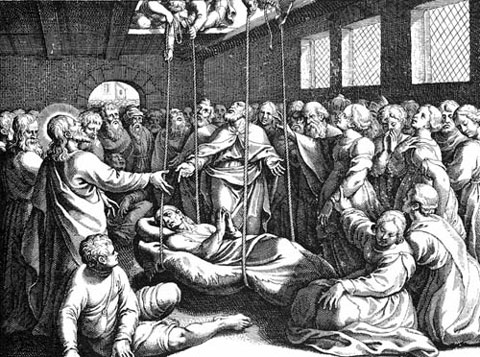Paradox

In the Gospel reading for Monday of the Second week of Advent Jesus heals a paralytic who has been lowered down through the ceiling of the crowded room where Our Lord has been teaching. It is a well-known story. Luke tells us when Jesus saw the faith of those who lowered the man on the stretcher he says to the paralytic, “As for you, your sins are forgiven”. The Scribes and Pharisees are offended for, they say to themselves, “Who but God alone can forgive sins?” Thereupon, Jesus tells the paralytic to arise, pickup his stretcher and go home, showing that “the Son of Man has authority on earth to forgive sins”. And so he does. The assembled crowd is awe struck saying, “We have seen incredible things today”.
In the Greek text of Luke’s Gospel the word translated as ‘incredible’ is ‘paradoxa’. Without getting into a debate about the relative meanings of cognate words in different languages, I would like to reflect on paradox. At he end of an interview published in First Things in 2008 Grant Kaplan asks René Girard, “How do you think the main theses of your work will be played out in the coming decades?”, to which Girard responds, “I think the question and the paradox of the scapegoat (it is there when you don’t see it, and not there when you see it) is going to be understood better and will play a role in apologetics that it has never played. The view of Christianity is not paradoxical enough. I think that when you read Kierkegaard carefully he is not very far from several of the things that the scapegoat theory can formulate more rationally.Therefore, it can be a tool of apologetics that hasn’t been discovered yet.”
It is interesting that Girard connects the paradox of the scapegoat with a rational apologetic for Christianity. Certainly, among Girardians, there are many who found the interpretive lens of mimetic theory focused on the Passion of Christ opened a profound intellectual understanding as well as a doorway into unexpected spiritual depths, Gil Bailie being a prime example (see the ending of Violence Unveiled). Our work is an outgrowth and development of just this apologetic. The Christian paradox is recalled in Gil’s question from one of his presentations in the mid-1980s, “How is it that we are saved by a hanged man?”. This eventually became “Why did it take the Crucifixion to save us?” in the Emmaus Road Initiative and God’s Gamble, exploring and elucidating the paradox of the scapegoat.
It is well known that the enigmatic and prolific Danish philosopher and preacher was a premier proponent of Christian paradox, but Girard’s reference to Kierkegaard as an ally for an intensified sense of Christian paradox was surprising, however. The following excerpt gives a sense of this perspective:
The Christian fact has no history, for it is the paradox that God once came into existence in time. This is the offense, but also it is the point of departure; and whether this was eighteen hundred years ago or yesterday, one can just as well be contemporary with it. Like the polar star this paradox never changes its position and therefore has no history, so this paradox stands immovable and unchanged; and though Christianity were to last for another ten thousand years, one would get no farther from this paradox than the contemporaries were. For the distance is not to be measured by the quantitative scale of time and space, for it is qualitatively decisive by the fact that it is a paradox.
On Authority and Revelation, page 60-1
The Scribes and Pharisees in Luke’s story from the Gospel were offended that “God once came into existence in time” to forgive sins and bring healing, but some in the crowd saw a paradox and believed. I read recently about Ivan Illich saying that the believer and the non-believer are like two men who are listening to a joke: “Both understand the words, but only one of them laughs and grasps the point of the story”

